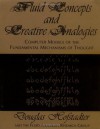251
Followers
4
Following
Manny Rayner's book reviews
I love reviewing books - have been doing it at Goodreads, but considering moving here.
Currently reading
The Greatest Show On Earth: The Evidence For Evolution
R in Action
Fluid Concepts and Creative Analogies
McGee on Food and Cooking: An Encyclopedia of Kitchen Science, History and Culture
Epistemic Dimensions of Personhood
Pattern Recognition and Machine Learning (Information Science and Statistics)
Relativity, Thermodynamics and Cosmology
The Cambridge Handbook of Second Language Acquisition
Mammoth Book of the World's Greatest Chess Games: Improve Your Chess by Studying the Greatest Games of All time, from Adolf Anderssen's 'Immortal' Game to Kramnik Versus Kasparov 2000
 This is a very good anthology of the greatest chess games of all time, but it does raise the question of what selection criteria to use. After a while, you realize that chess games are just another form of literature, and the criteria are in many ways similar to the ones you would, for example, use in a poetry anthology. In particular, some games are included just because they are well known and have become part of chess culture, the way a poetry anthologist might include Tennyson's "The Charge of the Light Brigade". (I'm sorry if you happen to like this poem. Personally, I think it's dreadful, but everyone ought to know it, because it's quoted so often). So, here, we have the so-called "Evergreen Game", which might have been brilliant when it was played 150 years ago, but now seems unbearably trite and obvious. Everyone knows that you can play that kind of sacrificial attack. If I'd been on the black side in a three-minute encounter on the Internet Chess Club, I'd probably have responded "nice :) gg" and asked for a rematch; I'd have forgotten about it within an hour. But, at the time it was played, it was remarkable, and it became an archetype which every serious chess player has looked at while they internalized those attacking skills.
This is a very good anthology of the greatest chess games of all time, but it does raise the question of what selection criteria to use. After a while, you realize that chess games are just another form of literature, and the criteria are in many ways similar to the ones you would, for example, use in a poetry anthology. In particular, some games are included just because they are well known and have become part of chess culture, the way a poetry anthologist might include Tennyson's "The Charge of the Light Brigade". (I'm sorry if you happen to like this poem. Personally, I think it's dreadful, but everyone ought to know it, because it's quoted so often). So, here, we have the so-called "Evergreen Game", which might have been brilliant when it was played 150 years ago, but now seems unbearably trite and obvious. Everyone knows that you can play that kind of sacrificial attack. If I'd been on the black side in a three-minute encounter on the Internet Chess Club, I'd probably have responded "nice :) gg" and asked for a rematch; I'd have forgotten about it within an hour. But, at the time it was played, it was remarkable, and it became an archetype which every serious chess player has looked at while they internalized those attacking skills.Moving further towards the present, it's quite surprising to play through the game from the first match between Kasparov and Deep Blue, where Kasparov lets the machine take one of his pawns, and gets a strong attack in return. Less than 20 years later, again, everyone knows what happens when you let a computer take one of your pawns. You may have a strong attack, which would quite likely win against a human, but the machine will be certain to find the defense, if there is one; most often, there is a line where it can come up with a miracle save. Here too, the machine manages to get its pieces coordinated just in time to save the day. But, when it happened, it was incredible. I remember being shocked that anyone could do this to Kasparov, and the game is justly famous.
I don't want to give the impression that it's all just history. Far from it. Some of the games still amaze you, even if you're a strong player. For me, the standout is another Kasparov game, the 1999 one against Topalov; I am one of many people who think this is the greatest game of all time. Facing a future world champion, Kasparov sacrifices a whole rook, to start a combination that is all of 20 moves deep, and chases Topalov's king to the other side of the board before he manages to catch the black queen. And it's not all forcing moves. Calculating 20 checks in a row would be nothing special at this level; here, there are points in the combination where Kasparov plays a quiet move, relying on the fact that Topalov can't escape from the net. Kasparov claims he planned the whole sequence before he started. It's simply incredible that a human being is able do such a thing.
As the old Indian proverb has it: chess is a sea where a gnat may drink, and an elephant bathe. Irrespective of your playing strength, if you like chess at all you will enjoy this book.











